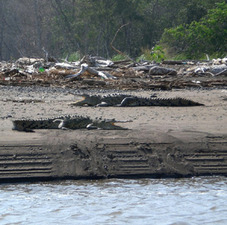Is that your phone or mine? No need for startled looks and pocket fumblings on the Tarcoles River, because there is no reception. Driving through a lush countryside just an hour away from coastal Puntarenas, the turn-off road might have been easy to miss, but ever-accommodating, tourist-friendly Costa Rica has signs above the dense foliage pointing the way to the dock. It’s quiet there, just 10-degrees North of the Equator, except for the chattering and screeching of birds high in the jungle canopy, so it is a pleasant surprise to discover the silent fast-flowing river at the bottom of the steps. Boarding a canopied boat, we were thankful for the shade from an enthusiastic afternoon sun that sent rivulets of moisture from nose ring to ankle tattoo, and conjured yearning thoughts of crackling ice cubes. Binoculars at the ready, many of the 56 bird species that call this home, appeared to entertain us, sometimes on one leg or perhaps with an athletic swoop for food. Macaws, toucans and the omnipresent egret impressed us while the grumpy heron eyed us suspiciously, but it was the tiny Ringed Kingfisher that captured our attention with his colorful plumage of reds and blues. Approaching an open bank at the river’s edge, at first glance it seemed that there was quite a bit of driftwood, branches and general debris on the shore, but upon closer inspection we saw dusty logs that slowly morphed into crocodiles taking a siesta. They were huge; we were excited. Cold-blooded aquatic reptiles congregated in freshwater habitats, needing to soak up the sun to gain energy. Once they were warm and needed to cool themselves, they panted like a dog or just kept their mouths open. It is no coincidence the collective term for this grouping is “a bask of crocodiles”. Fun fact: Crocodiles can’t stick out their tongues. After a few minutes of looking at the entry/exit marks on the bank, it was apparent that they weren’t going to “do something” and our expectations crumbled a little. Our boat captain, Jose, had a sly grin on his face as we chugged along through the backwater. Nosing into a bank he cut the engine, and after rummaging in his cooler he jumped out with something white in his hand and made happy slaps on the water. Bewildered, we watched him until someone breathed, “Oh, my God”, and we all echoed the sentiment when we saw a dark12-foot crocodile sidle alongside our boat. Barely breaking the surface this monster of the swamp slipped through the river intent on hooking up with Jose. Tucking his feet into his sides he was able to glide faster, his V-snout focused on a snack – toes and flip-flops, perhaps? Not daring to exhale, we watched the intrepid Jose entice the crocodile with chicken, although they normally have a diet of fish, reptiles and mammals. Rolling out of the boat for a quick swim was totally out of the question at that moment.  Gently teasing Osama (they call him bin Laden because they never know where he is) Jose held the tasty morsel higher and higher, luring our friend the croc out of the water so that we could see the smooth skin of his belly and the scaly deposits, called osteoderms, on his back. This guy is nuts! It’s all very well to teach a dog to sit up and beg – but a crocodile? I’d already had horrific visions of those razor-sharp teeth, driven by powerful jaw muscles, clamping down on an unsuspecting prey, yet little did I know that this tableau would unfold before me. Usually, the crocodile is a stalker; a predator that watches and waits for the right time to strike, then grabs, holds and munches. No doubt, Osama had a symbiotic relationship with our guide, and although I was seduced by this drama, I could not help but wonder if the stunt would go wrong. Measuring the distance judiciously, our new best friend received his treat and disposed of it rapidly. Frozen, nobody had the urge to reach over to pet him or whisper endearments – he deserved a lot of respect. Maybe he returned to the Crocodile Bridge at the mouth of the Rio Traceless to bask on the muddy bank and idly watch new hatchlings being helped by the females down to the water, swelling the world’s largest crocodile population in the wild. When the engine noisily coughed back into action, I looked over my shoulder a lot on the return trip. Later that night, safely back on board the cruise ship, I carefully examined the toilet bowl for unexpected visitors, just in case Jose had been training crocodiles to appreciate buns. b Cruises visiting Costa Rica from the Long Beach/San Diego ports transit the Panama Canal to Fort Lauderdale during the winter/spring months. |

